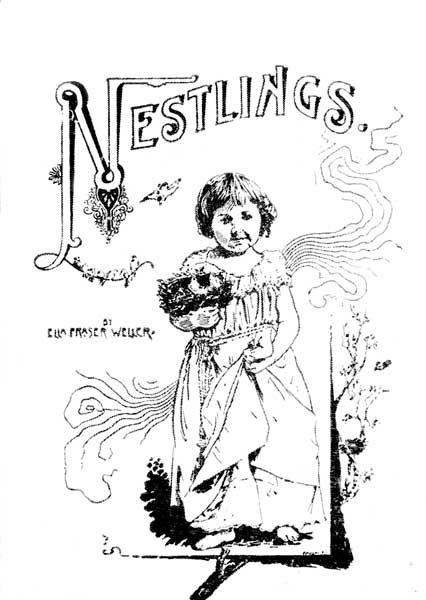
The Project Gutenberg EBook of Nestlings, by Ella Fraser Weller
This eBook is for the use of anyone anywhere at no cost and with
almost no restrictions whatsoever. You may copy it, give it away or
re-use it under the terms of the Project Gutenberg License included
with this eBook or online at www.gutenberg.org
Title: Nestlings
A Collection of Poems
Author: Ella Fraser Weller
Release Date: January 15, 2008 [EBook #24298]
Language: English
Character set encoding: ISO-8859-1
*** START OF THIS PROJECT GUTENBERG EBOOK NESTLINGS ***
Produced by The Online Distributed Proofreading Team at
http://www.pgdp.net (This file was produced from images
generously made available by The Internet Archive/American
Libraries.)
FROM PICTURES OF CHILDREN IN THE AUTHOR'S
IMMEDIATE CIRCLE OF FRIENDS
SAN FRANCISCO
CALIFORNIAN PUBLISHING CO.
1892
Copyright, 1892, by Ella Fraser Weller
These selections have come of occasions. They were not meant for the public eye. The thought of a possible book had given them greater unity, and the vision of a possible critic had probably modified their form. The mother-love for children called for them and they came; there is a conspiracy of mother-loves and the fugitive poems became a book.
The accompanying illustrations are shadows of real faces and may be readily duplicated in any limited circle.
"Nestlings" may serve as an album for some innocent faces, and perpetuate some possibly helpful sentiment.
Los Angeles, California
1 2 3 4 5 6 7 |
Arthur Edith Harold M. Lester Alfred Kennth Elliot |
} |
Frontispiece |
| Cornelia | Front Cover | |
| Between pages | ||
| 1 | Author and Child | 1 |
| 2 | Audrey | 5 and 6 |
| 3 | Carl | 11 and 12 |
| 4 | Ethelwin | 15 and 16 |
| 5 | Mother and Babe | 20 and 21 |
| 6 | Harold and Earl | 25 and 26 |
| 7 | Helen | 30 and 31 |
| 8 | Harold W. | 34 and 35 |
| 9 | Edith | 39 and 40 |
| 10 | Warren and Albert | 44 and 45 |
| PAGE | |
| My Baby's Feet | 1 |
| Two Little Seeds | 3 |
| Edith | 6 |
| The Theft | 8 |
| Who's Afraid | 12 |
| Lullaby | 14 |
| Two of Them | 15 |
| In the Meadow | 16 |
| Beatrice | 19 |
| My Boy | 21 |
| The Fairy's Motto | 23 |
| A Reverie | 26 |
| My Choice | 28 |
| Elliott | 30 |
| Three Little Kittens | 31 |
| What is the Use of Trying | 33 |
| Only Five | 35 |
| Unreconciled | 37 |
| The Naughty Dolly | 40 |
| Mabel's Lesson | 41 |
| Baby Kathleen | 43 |
| Two Boys | 45 |
"As I came o'er the distant hills
I heard a nestling sing:
'Oh, pleasant are the primrose buds
In the perfumed breath of spring!
And pleasant are the mossy banks
Beneath the birchen bowers—
But a home wherein no children play
Is a garden shorn of flowers.'"
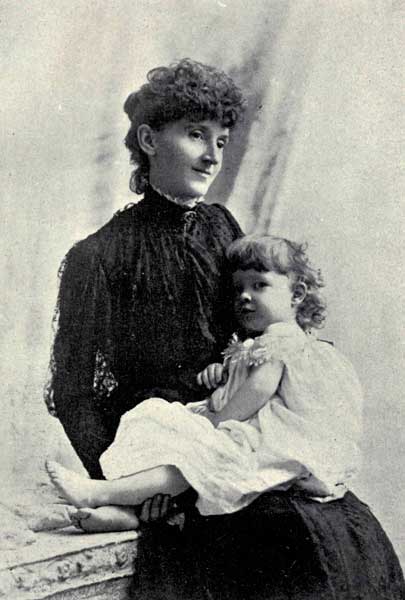
Within my palm, like roseleaves, dainty, sweet,
I fold with tenderest love two little feet—
Two little feet, twin flow'rets come to bring
To mother's heart the first sweet breath of spring.
Wearied with play, at last they lie at rest,
One satin sole against its fair mate pressed.
Dear little feet, fain would this hand 'ere shield
Thy tender flesh from thorns which lie concealed
Along the path which, stretching through the years,
Leads on to God, through joy and silent tears,
Oh, would that I could pluck from thy dear way
Whate'er might tempt these little feet to stray,
What though my hands be torn by thorn and stone,
Thy joy, for all my pain would soon atone;
If but thy mother planned thy life for thee,
No other path so bright as thine should be.
But what am I, that I my love should count
Greater than that of Him, who is love's fount—
Who sent from heaven, these dainty baby feet
To make thy mother's life and love complete?
What truer hand than His could mark thy path?
What greater love than God, thy Father, hath?
[Pg 2]What greater wisdom shields thee from all strife?
What greater mercy grants eternal life?
When shadows come, and clouds obscure thy way
He knows that darkness only heralds day.
If bruised thy flesh, though mother's heart may bleed,
He, in His mercy, knows thy greatest need.
Then, little feet, though mother's prayers may rise,
In love and trust, that never doubt implies
That God, thy steps may lead in ways aright,
And keep thy soul from sin's unholy blight,
I'll leave thy future in His hands alone,
And know, at last, He'll bring thee safely home.
Two little seeds sank deep in the earth,
Down through the narrow darkening way,
Side by side in a slow descent,
Away from the light, on an April day.
Two little seeds—you scarce could tell
One from the other—both brown and round,
Planted, that day by the self-same hand
In the mellow depths of the self same ground.
Nestling together they chattered thus,
As close in their cozy nest they lay:
"What are we here for down in the dark
Hidden so deep from the light of day?"
"What are we here for? I, for one,"
Said the first little seed, in a gruesome tone,
"Shall just go to sleep, and sleep right on,
Close by the side of this round smooth stone.
I shall not stir, but I'll sweetly sleep,
Until old Mother Earth must surely see
That here, in the damp of the chilly ground,
Is never the place for the like of me."
Proud and idle, it went to sleep,
[Pg 4]And it slept right on, though the warm rain fell,
And Nature found, when she came to look,
Nothing at all but an empty shell.
The other seed mused—"It cannot be right
Thus in the earth to so idly lie,
This life of ours will wasted be
And soon in this gloom, unused, must die.
I shall not sleep—from this narrow shell
I'll find my way, and out of this night
I shall reach right up, until day by day
I nearer and nearer approach the light.
Already I feel the welcome heat
Warming the loam that around me lies,
Already I see in my sweetest dreams
The genial sun and the azure skies.
Oh! slumber then in your slothful ease,
By your foolish fancies alone deceived,
While the grandest victories Earth e'er knew
Are only waiting to be achieved."
So out from his shell the wee seed burst,
And stretched to the full of its graceful length,
While the light and warmth of the Summer sun
Added each day to its beauty and strength.
Its slender fingers of tender green
Catches the trellis here and there,
Higher and higher reaching up,
[Pg 5]Branching out in the Summer air.
Oh, fair are the blossoms it bears for all,
And fragrant the breath of its golden bells;
Glad is the music they ring for you,
From the perfumed depths where the dewdrop dwells.
They wake you out of your sluggish sleep—
Their voices are ringing—Arise! Arise!
God gave you your life to use for Him,
And can you the gift of a King despise?
Your strength will waste if it is not used,
The life He has lent He will ask again,
Can you bring but the empty shell to Him,
And tell Him His gift has been in vain?
[Pg 6]
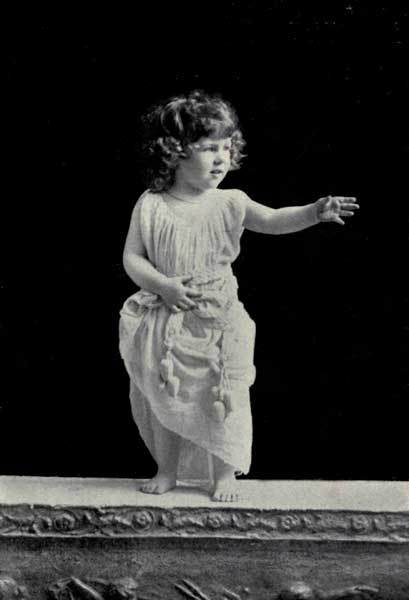
One flower within my garden grows—
My friend's is crowded,
But mine is rarer than the rose,
My skies unclouded.
I shield it when the north winds blow
So harsh across it,
I cannot let them kiss it so,
And rudely toss it.
So beautiful it is and frail,
I almost dread
The butterflies that soar and sail
So near its bed.
I envy not the wealth of flowers
Across the way;
My radiant flower exhales perfume
For me each day.
My gratitude to Heaven for this,
My one late flower;
And such a sense of rapturous bliss
[Pg 7]Ascends each hour.
Dear Heaven, still a gift bestow
And grant to me
The grace to train my flower to grow
For Heaven and Thee.
And yet, because I love it so
My heart will fail,
When life's rude tempests 'gin to blow
My blossom frail.
Help me to shield it from the rain—
From winter's blast—
And I will give it back again
[Pg 8]To Thee at last.
A crow flew down from a tall oak tree,
Just as important as he could be;
For a Congress of birds was to meet that day,
And he had determined to have his say.
He plumed his feathers and looked severe,
As the birds flew in from far and near.
A Mocking Bird sat on a limb near by,
With a desperate look in his round, dark eye;
He was the culprit—a thief he had been,
The Thrush and the Blackbird had "run him in."
He had stolen the nest of the little brown Wren
From the tangled depth of a shady glen.
The Hawk was the Judge, and sat in state,
Ready to seal the prisoner's fate.
"A thief is worse," said the Bobolink,
"Than anything else on earth, I think."
But—"Order in Court"—rang close to his ear,
Robin, the Sheriff, was standing near.
Then the Crow began in his deep sub-bass,
And his pompous manner to plead the case.
He spoke of the prisoner's youth at first,
But a murmur of scorn from the audience burst,
[Pg 9]So he changed his tactics and said: "I hear
Of late the prisoner has acted queer.
In fact, I can make it to you quite plain
That most of his ancestors were insane.
Young as he is, and with such a taint,
'Tis folly to make against him complaint."
He talked till the Mocking Bird felt secure,
Feeling acquittal was coming sure.
Then the Owl rose up, and his blinking eyes,
Droll and uncanny, looked wondrous wise:
"Tu whit, tu whoo! You will find it vain
To plead that the prisoner's now insane;
Insane, did you say? Oh, well, perhaps—
But there is a prison for all such chaps,
The Mocking Bird's record has always been
Soiled and blotted by many a sin.
If this were the first of his insane tricks—
But the family trait to the fellow sticks.
Only last week—but you all have heard—
How he broke up the home of the Humming Bird.
Stealing and hiding the theft by a lie
Is the poorest rule for a bird to try.
We have borne with him for many a year,
But now we must act. Have I made it clear?"
And he loudly read from the law a clause,
Then flew to his perch, amid loud applause.
[Pg 10]The charge to the jury was something fine,
Pathos and power in every line.
They were out but a moment, then entered again,
Nor had the eloquent charge been vain;
For the verdict "Guilty," rang out clear,
Filling the pris'ner with abject fear.
Then the Judge rose up, and shaking his head,
Solemnly, thus the sentence read:
"Let every bird from yon prisoner's breast,
A feather pluck for the Wren's new nest."
Scarce had they heard the words pronounced
Ere they all in a mob on the culprit pounced,
Each plucking a feather, he flew to the glen
Eager to comfort the poor little Wren.
The Mocking Bird shivered with cold and pain,
"Oh! never," he cried, "will I steal again,
And I'll try, oh! I'll try to do what is right,
Nor ever be found in such a sad plight."
The dear, gentle Dove, who had lingered behind,
Came close to the prisoner, loving and kind,
And she whispered so low, "Come home to my nest;
I'll care for you tenderly, give you my best.
I know you are sorry, I know you will try,
So come, let us home to my warm nest fly."
So nursed by the Dove, one fair summer day,
He kissed her and blessed her, and then flew away.
[Pg 11]But whether he truly became a good bird
I'm sure I can't say, as I never have heard.
But I know on his record there'll ever remain,
Though the act be repented, its dark, ugly stain;
And he'll find o'er and o'er such tricks do not pay,
For punishment comes, and oft comes to stay.
No matter how small is the act that we do,
This thing, little children, you'll find always true:
That somehow or some way it does come about,
The wrong that we do will soon find us out,
And we're filled with such sorrow and in such a plight,
We see very clearly, "'Tis best to do right."
[Pg 12]
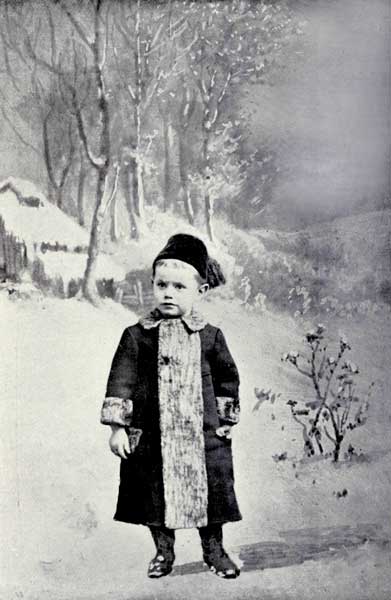
Run, little man, or old Jack Frost
Will catch you ere you know it,
I am sure you are half afraid of him,
Though your manner does not show it.
With your soft warm cap and your overcoat,
You think you can safely meet him.
The harsh old fellow will have to look sharp,
Or the coy little man will cheat him.
See how bravely he faces the piercing wind,
Not afraid of the cold is he,
And the roses bloom on his rounded cheek,
As he romps in his boyish glee.
Heigh-ho, little man, if you meet the storms,
That blow o'er the hills of life,
With half the courage you show to-day,
You are sure to win in the strife.
Then go, little man, and never you fear
But look the world in the face,
And you'll find on the heights of life, my boy,
[Pg 13]That world will make you a place.
'Tis only the brave that fortune finds,
'Tis only the good who win;
The sluggards' bulwarks are tumbled down,
And he falls in the gutters of sin.
So up, little man, and never say fail,
Though frosts of adversity fall;
With courage your armor, and hope for a sword,
[Pg 14]There is naught your heart can appall.
Slumber sweet, noddlekins,
Nurse is full of prickly pins,
Mamma's full of kisses sweet
For dimpled hands and rosy feet.
Slumber comes—close your eyes,
Angels watch you from the skies,
Little dreams come drifting down
To veil those roguish eyes of brown.
Nestling close on Mamma's arm,
You are safe from every harm.
Close I clasp you—all my joy,
Centers in you—darling boy.
Now your eyelid fringes meet,
Kissed by slumbers, soft and sweet.
Who can wonder, angels keep
Tender watch when babies sleep?
For I'm sure no lovelier sight
Ever graces realms of light,
They are golden links of love
Binding earth to Heaven above.
Sleep, my baby, sleep and rest,
Nestled close on Mother's breast;
Harm can never reach you here,
[Pg 15]God and Mother guard you, dear.
Where is the little boy Tommy?
Not in the parlor with hammer and tacks,
Not in the kitchen with sharp little axe,
Not on the lawn where patient old Bose
Lies half asleep with a fly on his nose;
Not in the garden planting his seeds,
Pulling up flowers as often as weeds,
No little Tommy.
Nor in the barn do I see his short legs,
Climbing the ladder to hunt for the eggs;
Nor yet in the meadow where cowslips are yellow,
Half hid by the grass, do I see the wee fellow,
I am sure he was here but a moment ago—
I wonder why boys are gotten up so!
Queer little Tommy.
Oh! down in the orchard where apples are green
A moment ago Master Tommy was seen—
High in the top of a gnarled old tree
Stuffing his pockets, and hiding from me;
Playing me tricks, for he knows full well
That his mamma's away, and that I won't tell.
I won't tell, and you wonder why?
Well, Tommy's a boy—and so was I.
I heard the grasses talking, talking,
Down in the meadow, one summer day,
The prettiest things I heard them whisper,
Nodding their heads in a quaint wise way.
Whether they knew that I was listening,
And would tell to you their story sweet,
I know not; but surely they would not chide me;
For the gossiping winds their words repeat.
They told how they loved the golden sunshine;
How once in the gloom of a strange long night
They feared they were lost, until angel fingers
Touched them with life, and they found the light.
And how the tints of emerald landscape
Were caught from the sunlight on cloud and sky;
How dewdrops, gems from the crystal fountains,
Were showered o'er earth from realms on high.
I heard them say, how the cowslips yellow
Were bits of the sun, dropped here and there
How the lilies pure, with their snow white petals,
[Pg 17]Were down from the wings of angels fair.
And the blue-eyed violets, shy and tender,
With breath from the censer of heaven sent,
Were bits of the sky, by the summer borrowed,
And just for the season to Flora lent.
They told how the daisies and buttercups yellow,
Marked where the feet of the swift hours trod;
When fickle they fled from the pussy-willow,
To the newer love of the golden rod.
How the bolder touches of gorgeous color
From the crimson glory of sunset came,
And touching with blood the swaying poppies,
Set hill and valley and field aflame.
Oh, they told me things that set me thinking,
Thoughts that never were mine before;
And the love of Christ for his wayward children
Filled me with wonder more and more.
How even the flowers and grasses know Him,
How He loves and cares for their needs alway,
That they take no thought for the coming morrow,
But live and trust in the bright to-day.
And may not we, who are Christ's own Children,
Blotting the present with anxious tears,
Live our joy, and leave to His mercy
[Pg 18]The shadowy doubts of future years?
The somber gloom of the distant mountain
Reveals no path that our feet may tread,
But at its foot upwinding ever
It stretches out like a silver thread.
Down in the meadows, among the grasses,
My pillow of daisies and violets blue,
The sweetest stories of all the summer
I hear, and come and whisper to you.
I may not tell you all they told me.
Go press your ear to the fragrant sod—
The pulse that beats in Nature's bosom
[Pg 19]Throbs in the heart of Nature's God.
Dimpled hands and dimpled cheeks,
Dimpled chin beguiling;
Rows of gleaming, pearly teeth,
Rosy lips a smiling.
Rings of dark and shining hair,
Around a white brow clinging;
Hazel eyes where gladness shines,
And sets the heart to singing.
Dainty feet with dimpled toes,
Little hands caressing;
Gurgling laugh and lisping tongue
Helplessness confessing.
Roguish glances, sidelong, sweet,
What is Baby doing?
Face half hidden in my breast,
All my kisses wooing.
Softly, softly slumber comes,
See her eyes are closing;
Cupid, shorn of bow and wings,
[Pg 20]In my arms reposing.
Blessed home where baby comes,
What a void without her;
Joy and love and sunshine bright,
Lingers all about her.
Not a shadow comes to me,
But at once 'tis lifted,
Just because this Baby sweet,
Down from Heaven drifted.
[Pg 21]
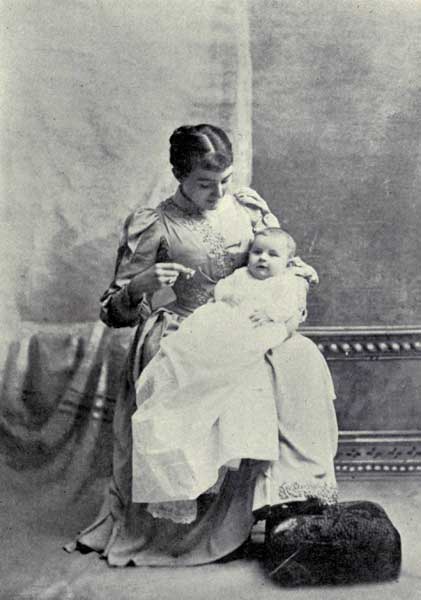
Oh, where did you come from, baby mine,
With your face like a cherub's sweet?
Did the angels scatter with flowers, the path
That was pressed by your little feet?
Or, did you fly from the realms of love?
On your shoulders methinks I see
In the crumpled roseleaf dimples there,
The place where the wings should be.
The angels were loth to leave you, my child,
I know they were filled with fear,
I almost fancy I hear their wings
Hovering somewhere near.
Oh, they need not doubt that your mother's heart
Holds less of love than their own,
And though I may lack of their wisdom my pet,
My love for the lack shall atone.
Oh, gift of the angels—Gift of God,
What a trust for a mortal to hold!
A boy to guide in the paths of right,
A soul for Heaven to mold.
My darling, I fain would shelter you here,
[Pg 22]Close, close on my own fond breast,
For my heart shrinks back from the terrors of life
When my bird flies out of the nest.
If only Christ gave me the power, my boy,
To suffer and toil in your stead,
I'd pluck every thorn from your path in life
And toss you its roses instead.
And the selfish love of your mother, boy,
Would rob you of life's best boon,
And drown the chorus of angel choirs,
By setting the world attune.
So I'll send back the tears of a mother's love,
I will crush out a mother's fear,
And push you with tender, trembling hands
Out into Life's highway, dear.
Yet strongly armored by truth, my boy,
And shod by your mother's prayer,
I'll know that your Heavenly Father's love
O'ershadows you everywhere.
And that sometime, after life's battle is o'er
In the land of our promised rest—
I shall meet you, my baby, to part never more,
[Pg 23]And hold you once more on my breast.
A family of Fairies lived under the ground,
And search as they might no place co'd be found,
Where a home they could make, a snug little nest,
A refuge from harm when by foes they were pressed.
Day in, and day out they skurried about,
Putting fish worms, and beetles, and such like to rout.
At length one, the most energetic of all,
Found something quite large and round like a ball,
So calling the family, with pickaxe and spades
They soon in the wonder an opening made.
And what do you think they found it to be?
A turnip so large it might have been three.
So they hollowed it out as fast as they could,
Not pausing a moment for rest or for food.
A part of the contents they hurled from the door,
And trampled the rest to thicken the floor,
And ere through the holes the sun 'gan to peep,
The turnip was empty, the Fairies asleep.
The gardener on passing his turnip bed saw,
'Midst the flourishing green a queer looking flaw:
"Why, how can this be? I'm sure yester-e'en,
That turnip, as any, was thrifty and green.
[Pg 24]There may be a grub at its root, or perhaps,
A bug at its top, they are meddlesome chaps;
I'll wait until morning, the heat of the sun
May have proven too much for a delicate one."
In the meantime the Fairies waked up by his words,
Laughed and chuckled together as happy as birds.
"Before he comes round, we'll have finished and done,
And he'll find that his turnip is not worth a bun.
He will leave it and we will hold revelry high,
For that some may have life, why, something must die."
So they cut a small hole through the top, for a door,
The tiniest roots from the outside they tore,
And made them a ladder, so firm and so fair
It answered their purpose and served as a stair.
A cabbage leaf carpet, a bedstead so neat
They made in a minute, just out of a beet,
A table and chairs were made out of roots,
Supported in style by asparagus shoots.
Lace curtains of spider webs, hung o'er the doors,
And bumble bee skins were the rugs on the floors,
Their dishes were all from the button weed made,
Their knives and their forks from the tiny grass blade,
Corn silk for their cushions, thistledown for a bed,
"Our home will be royal," they boastingly said.
They caught a black cricket and hollowed him out,
For a crib the sweet baby must have, without doubt,
And the cricket, his life, ought gladly to give,
[Pg 25]For "something must die, that others may live."
But why should I tell you the wonderful way
They furnished and finished their house the next day?
They sent invitations to their four hundred friends—
"At Home—after sunset until the night ends."
But plans that are made for ends of our own,
May steal our sweet plums and leave us the stone.
Next day as the gardener walked down through the rows
Pressing down the soft earth here and there with his toes,
He found that the turnip looked worse than before—
And grimly he smiled, for he saw the top door,
That the Fairies forgot in their hurry last night
To close with the curtains, and fasten down tight,
So stooping, he gathered the leaves dry and dead,
Gave a vigorous pull, and away o'er his head
He sent it a-flying—Poor Fairies, good-bye—
"That something may live, you know, something must die."
[Pg 26]
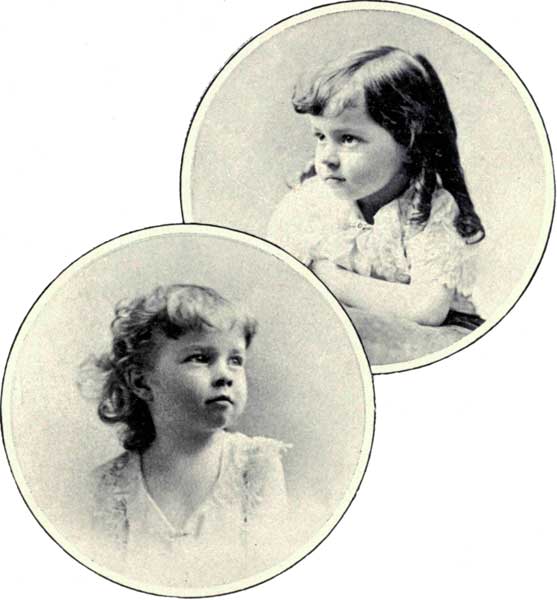
Standing to-night beside their little bed,
All richly hung with tapestry and lace,
I look half sadly down upon my treasures there,
My boys, so full of innocence and grace,
My little lambs, safe folded for the night,
Caught by the god of slumber unaware.
The sturdy lad's soft cheek close pressed
Against his baby brother's, soft and fair;
The smile is still upon the boy's red mouth.
On baby's face the roguish dimples lie;
The curls of brown, the shining rings of gold,
Like sun and shadow tremble as I sigh—
Sigh that so much of innocence and grace
So soon must leave a mother's tender care—
So soon the hurrying years crowd on apace,
And bring to each of toil and pain his share.
To-day, when poisoned breath from lips profane,
Blown harshly from the busy street below,
Entered my safe retreat, and brought
Quick to my side the lad, his cheeks aglow,
His hazel eyes with wonder wide met mine;
I could not speak—I stooped and kissed his hand.
[Pg 27]The shadow passed, my heart leaped up in joy—
The words—the sin—he did not understand.
But ere the cloud had left his childish face
Upon my heart this deeper shadow lay:
I cannot always keep my darlings safe;
They'll leave the shelter of the fold some day.
Strong-willed, strong-hearted, loving boys—
Harmonious souls by angels set attune—
Oh, may my fingers touch the keys aright!
I ask of Heaven than this no greater boon;
No greater boon than wisdom from on high
To strengthen them against the snares of sin;
To teach them how to live and how to die,
To hear their Master bid them "Enter in!"
So, with my good-night kiss upon your lips
I'll banish all the shadows from my heart,
And know He'll send His blessed sunshine in,
[Pg 28]If only you and I will do our part.
I'm only a boy, but before me lie
Life's paths untrod, and a sunny sky
Bends o'er the paths, and smiles on me.
And under its blue serene, I see
Two ways stretch out, one, narrow and straight;
The other, broad, and an open gate
Beckons me on, and smiling and sweet
Are the Heavens fair, and down at my feet
Fair flowers bloom, and the grasses nod
On the level slope of the emerald sod.
In the bosky dells my eyes discern
The feathery flakes of the filmy fern,
The birds' low song in the shadows deep
Lull my fancies to dreamful sleep.
The sun-flecked slopes and the open gate
Seem for my eager feet to wait.
But the narrow way, though rough and steep,
Has a charm for me, and my senses leap
As I view the heights that seem to rise
From the lowly earth, to the sunlit skies.
Though rough and steep, and with danger fraught,
Though the glorious heights with my life be bought—
[Pg 29]I'll turn from the broad road leading down,
And seek the heights and the laurel crown.
From the blood-stained prints of my thorn-pierced feet,
Spring wonderful flowers, whose fragrance sweet,
Borne on the breath of the balmy air,
Charms my heart and dispels my care.
The beetling crags that block my way,
The storm cloud's gloom, where the lightnings play,
But give me strength for each new emprise,
And joys my soul as I slowly rise;
For snares and cliffs, to a boy like me
Should only incentives to action be.
I'm bound to rise—If I earnestly try
I know I can reach the hilltops high.
But I have no time to loiter and play,
On the tempting slopes of the downward way,
But must follow the path, by good men trod,
[Pg 30]To rise to the heights of life and God.
Dear little cherub, from isles of the blest,
What is your destiny? What is your quest?
Have you been watching us with your bright eyes
Till you thought you would come as a cunning surprise?
Did you see that this house lacked a baby so sweet
To widen the circle and make it complete?
Did you see from your perch in the realms up above
The sweet mother-heart overflowing with love?
You thought it so precious, you flew to her breast,
You sought it and found it, and found, too, your rest—
Your refuge from sorrow; your fortress so strong,
May you rest in it, dwell in it, cherish it long.
You are welcome as dewdrops when parched are the flowers;
You will brighten the days till they shrink into hours.
May heaven watch over you, fill you with joy,
And bless the whole circle, in you, little boy.
[Pg 31]
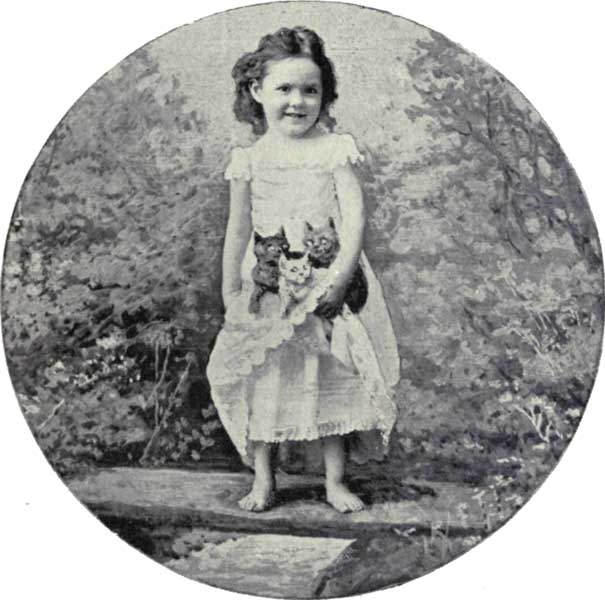
Three little kittens, black, white and gray,
Went out in the garden one morning to play.
Said the white one, "I want to play hide and go seek,
'Tis long since we played it, much more than a week."
"All right," said the gray, "I'm ready for fun,"
And he started away with a hop and a run.
"Just wait," said the black with an ominous growl,
His face wrinkled up in the crookedest scowl.
"It's an old-fashioned game—I shan't play at that,
It is not becoming a stylish young cat;
I'll sport with the leaves or I'll play in the sun,
But it's tiresome, unpleasant and foolish to run."
The others agreed in a good-natured way,
And the three little kittens began then to play;
The dead leaves went flying to right and to left,
All three, for a time seemed of senses bereft;
But something went wrong—"I say that's not fair,"
The black kitten cried—"and to play I don't care"—
The gray and the white coaxed him hard for awhile,
But nothing would cause him to speak or to smile,
So they left him alone and hied them away—
"Hide and seek" 'mongst the roses and lilacs to play.
[Pg 32]He heard their gay laughter and sullener grew—
The sun was too hot—the skies were too blue,
The grass, he was certain, was damp where he lay,
All things had conspired to annoy him that day,
He could bear neither sunshine, the mirth that he heard,
The hum of the bees, nor the chirp of a bird.
How silly they seemed—it made him so cross—
The pleasures of life were nothing but dross,
So he hastened away in a fit of despair;
All things were against him and "nothing was fair."
And now, little people, does any one know
A child who is cross, and always acts so?
Who cries with a pout—"I say I shan't play,
Unless you do everything just as I say."
If beaten at games, he says "It's not fair"—
And takes of good things far more than his share.
If you know such a child, I'm sure you will find
He is sour and unhappy, because he's unkind;
To be happy, be gentle, good tempered and sweet
[Pg 33]To playmates and elders and all whom you meet.
"What is the use of trying?
I never can learn to fly,
See how the lark goes floating
Up to the sunlit sky;
He never failed as I have,
See how he flies at ease,
Light as a down of thistle
Tossed on the tremulous breeze.
I have been foolishly trying,
Thinking I, too, might rise,
I'll stay down here in the hedges,
And leave to the lark the skies."
So he stayed in the crowded hedges,
And lived through the summer long,
Only a common sparrow—
One of a common throng.
"What is the use of trying?
Pouring o'er book and slate,
I fail, and shall keep on failing,
For men are created great.
[Pg 34]'Tis folly to think that study
For so many hours a day
Is going to make out of boys and girls,
Wise women and men alway.
So what is the use of trying?
A common lot shall be mine;
Why muddle my brain with study?
I never was meant to shine;"
So away in the closet cupboard
The books kept gathering dust,
And the mind they were meant to nourish
Was buried and lost in rust.
So the hedges go gathering sparrows,
And the larks still mount to the sky,
And out from the crowded byways
Few souls gain the mountains high.
Have courage and keep on trying,
Though a sparrow, a lark cannot be,
The highways that lead to the Pisgahs
Are open to you and to me.
[Pg 35]
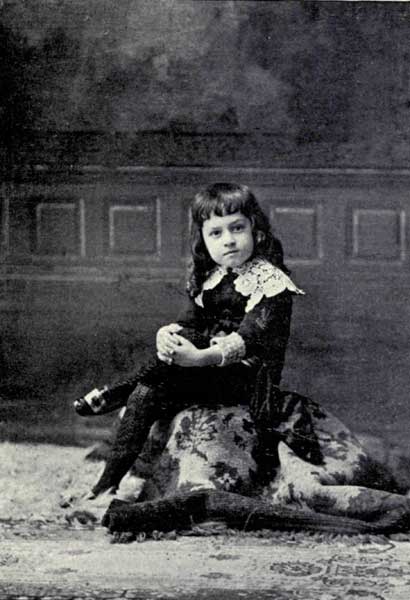
I've had a birthday party—
Of course I'm only five—
But I had the jolliest time
Of any boy alive.
I got some little chickens,
The roosters cannot crow;
But on my mamma's table
I stand them in a row.
I got the funniest bank—
A man, all mouth and eyes,
He swallows every penny,
And every dime he spies;
My mamma set a dinner
For Ollie and for me.
'Twas just a little party,
One little girl, you see.
We had the nicest oranges,
And nuts, and apples red,
And just the tiniest custard pie,
[Pg 36]Plum cake and snow white bread.
We ate up all we wanted,
Mamma sat by and smiled,
And kissed my curls and dimples,
And called me "precious child."
And when the day was over,
And I was snug in bed,
She found the prettiest book I have,
And lots of stories read;
And then—I can't remember,
My head was in a mix;
For when the sand-man found me,
[Pg 37]I dreamed that I was six.
Hid away in the corner I found it,
A little shoe worn out and old;
But dearer to me in my sorrow
Than all earth's treasures of gold.
Scarcely lost to the foot's soft imprint,
I can fancy its warmth still there
As I press it close, close to my bosom
And sob in my hopeless despair.
My arms are so useless and empty,
My heart is so hungry and sore,
My dear little golden-haired baby,
Will lie on my breast, nevermore.
Nevermore, will I feel the soft pressure
Of his rosy lips pressed against mine,
Nevermore will his arms warm and tender
My neck with caresses entwine.
You mock when you say God has ta'en him
Away from the sorrows of earth,
What love could shelter and shield him,
Like the love that had given him birth?
[Pg 38]Will it heal the mad longing to fold him
Once more to my grief-stricken heart,
To tell me I'll meet him in Heaven
Nevermore from my darling to part?
Your words are well meant, I can feel it,
But the wound is too deep and too fresh,
I cannot deal now with the spirit,
Oh! God give him back in the flesh.
Let me see him again as I saw him,
So winsome, so rosy, so bright,
His baby face dimpled and roguish,
His blue eyes with laughter alight,
Let me feel in my mad desolation,
His heart throbbing close to my own,
Does God pity me in my sorrow?
Does he care for my heartbroken moan?
Had he need of my darling in Heaven
That the life of my life he has ta'en?
Do not try, while my poor heart is breaking
The mystery of death to explain,
Let me sit by myself in the shadow,
Let me kiss as I will the worn shoe;
For I'm chilled by the breath of the angel
That over my hearthstone flew.
Let me weep as I will, and the teardrops
[Pg 39]May wash from my dim eyes away
The shadows that hide in their garments,
The light and the glory of day.
Perhaps, as you say, Christ is tender,
And he'll shelter my lamb in his breast,
But your sympathy hurts me, I cannot—
I will not say yet—"It is best."
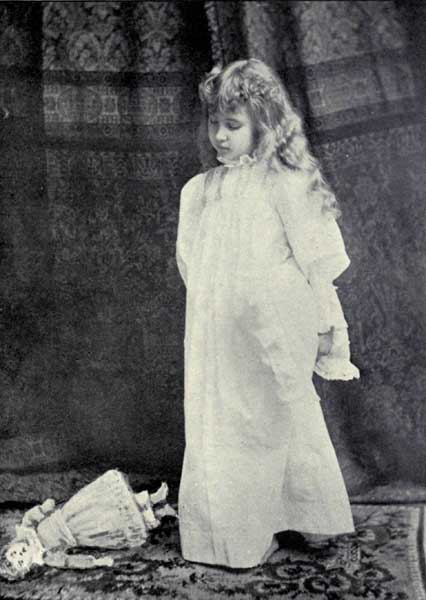
"Oh, Dolly! How can you be naughty?
You've been naughty the whole day through;
You spoiled your white dress in the gutter,
And stuck up my pictures with glue;
And when in a corner I put you,
And plead with you so to be good,
You stared in my face with a simper,
And acted so saucy and rude.
I have tried so hard to be patient—
For I'm sorry to punish you so;
And I love you, my poor naughty Dolly,
Much more than you ever can know.
I hope you will think the day over;
I am going to bed now—good-night.
Be a good little Dolly to-morrow,
[Pg 41]And try all the day to do right."
Mabel stood by the garden gate
Swinging her hat in a careless way;
A frown on her face, a pout on her lip;
For naughty had Mabel been that day.
A pert brown Thrush on a bough o'er head
Fluttered his wings and carolled his song.
Happy as ever a bird could be,
Singing and working all day long.
Mabel had risen late that morn;
The breakfast was over, and everything cold;
Mamma was busy and Harry was ill,
And Bridget did nothing at all but scold.
Long ere the light, the Thrush had been out,
Catching his breakfast as best he could;
Working and singing with right good will—
Never was bird in a merrier mood.
Mabel had started the day all wrong,
Had hurriedly dressed and forgotten to pray;
The bird sang on and she heard his song,
[Pg 42]And the wonderful things he seemed to say.
"I waked," he sang, "as one by one
The stars slipped out of the purple night,
Ere the slender fingers of infant dawn
Could catch the thread of their faint pure light.
I bathed in the brook that sings near by,
And borne on the breath of the opening day,
Joyously up to the brightening sky,
I sent to my Maker a grateful lay.
And so I go on and I build my nest,
Happy and busy as bird can be;
For I know though the winds blow cold and chill,
My Heavenly Father guardeth me."
Mabel looked up with a penitent face,
The bird had flown, but the lesson stayed,
And Mabel went in from the garden gate
A better, and wiser, and happier maid.
For bright, or dark is this life of ours,
Just as we make it, children dear—
With naughty deeds come the chilling showers
[Pg 43]While the skies of the good are bright and clear.
Into my life, out of Paradise,
She came like a bird, and the low-hung skies
With the muttered threats of their tempest cloud,
That had covered my life with its dismal shroud
Vanished like dew, when the new day springs
From her rosy couch, and unfolds her wings.
Unfolds her wings for her airy flight
From the mist hung dawn to the purple night,
She hovered so near I could almost reach—
My trembling heart was o'erfull for speech,
When joy! oh! joy, on my throbbing breast
She folded her wings for a moment to rest,
For a moment the gates of pearl were ajar
All earth was alight with the radiant star,
That shone o'er Bethlehem's manger low,
On that wonderful night of the long ago.
But I recked for naught of the glowing skies,
While the lovelight shone from her starry eyes;
But my beautiful song bird, blithe and free
With her plumage white was too fair for me,
[Pg 44]Adown through the shining gates there came
Voices of angels, calling her name.
I had felt the thrill that her presence brought,
I had learned the lesson her love had taught,
She came, and my life was a garden fair,
She fled, and that life was a desert bare,
But my beautiful bird I will find once more
When I wing my flight to the far off shore,
And Heaven, Ah! Heaven will be so bright
When I find my bird with her plumage white,
When I look once more in her starry eyes,
I shall know I have entered Paradise.
[Pg 45]
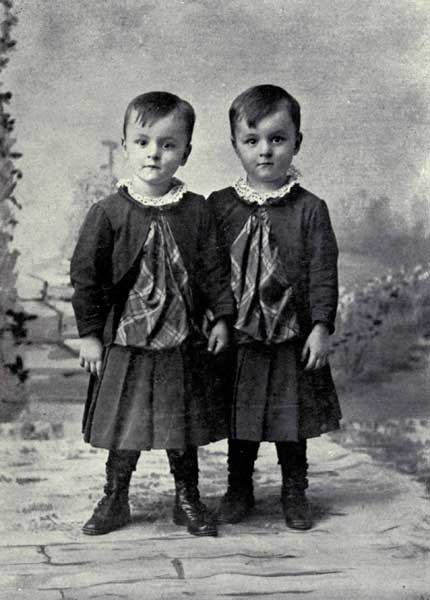
Two boys beside my knee
With eyes so dark and deep;
Two snow-white souls, the God of Love
Has given to me to keep.
My cup of joy o'er-ran
That Summer's day,
I knew they were my own—
My own alway.
My fair twin boys—Ah! me,
I look for you
Out o'er life's trodden paths,
And turn anew
To Him, who never yet
Has failed to hear
A mother's prayer for those
She holds so dear.
Oh! eyes so dark and sweet,
May Heaven's light
Shine o'er the paths you tread
And make them bright.
[Pg 46]You could not go astray—
For all along
A wall of prayer, I build
So high and strong,
The tempters cannot scale
Its dizzy height,
And lead my darlings out,
To endless night.
These dimpled baby hands
God gave to you
Through rock-ribbed hills of life
Their way to hew.
Nor would I, though I might
Save you the test;
For well I know, beyond
Lies Heaven and rest.
This kiss, a pledge I give
To live for you;
And know full well, that God
The rest will do.
The San Francisco Printing Co.
411 MARKET ST
End of the Project Gutenberg EBook of Nestlings, by Ella Fraser Weller
*** END OF THIS PROJECT GUTENBERG EBOOK NESTLINGS ***
***** This file should be named 24298-h.htm or 24298-h.zip *****
This and all associated files of various formats will be found in:
http://www.gutenberg.org/2/4/2/9/24298/
Produced by The Online Distributed Proofreading Team at
http://www.pgdp.net (This file was produced from images
generously made available by The Internet Archive/American
Libraries.)
Updated editions will replace the previous one--the old editions
will be renamed.
Creating the works from public domain print editions means that no
one owns a United States copyright in these works, so the Foundation
(and you!) can copy and distribute it in the United States without
permission and without paying copyright royalties. Special rules,
set forth in the General Terms of Use part of this license, apply to
copying and distributing Project Gutenberg-tm electronic works to
protect the PROJECT GUTENBERG-tm concept and trademark. Project
Gutenberg is a registered trademark, and may not be used if you
charge for the eBooks, unless you receive specific permission. If you
do not charge anything for copies of this eBook, complying with the
rules is very easy. You may use this eBook for nearly any purpose
such as creation of derivative works, reports, performances and
research. They may be modified and printed and given away--you may do
practically ANYTHING with public domain eBooks. Redistribution is
subject to the trademark license, especially commercial
redistribution.
*** START: FULL LICENSE ***
THE FULL PROJECT GUTENBERG LICENSE
PLEASE READ THIS BEFORE YOU DISTRIBUTE OR USE THIS WORK
To protect the Project Gutenberg-tm mission of promoting the free
distribution of electronic works, by using or distributing this work
(or any other work associated in any way with the phrase "Project
Gutenberg"), you agree to comply with all the terms of the Full Project
Gutenberg-tm License (available with this file or online at
http://gutenberg.org/license).
Section 1. General Terms of Use and Redistributing Project Gutenberg-tm
electronic works
1.A. By reading or using any part of this Project Gutenberg-tm
electronic work, you indicate that you have read, understand, agree to
and accept all the terms of this license and intellectual property
(trademark/copyright) agreement. If you do not agree to abide by all
the terms of this agreement, you must cease using and return or destroy
all copies of Project Gutenberg-tm electronic works in your possession.
If you paid a fee for obtaining a copy of or access to a Project
Gutenberg-tm electronic work and you do not agree to be bound by the
terms of this agreement, you may obtain a refund from the person or
entity to whom you paid the fee as set forth in paragraph 1.E.8.
1.B. "Project Gutenberg" is a registered trademark. It may only be
used on or associated in any way with an electronic work by people who
agree to be bound by the terms of this agreement. There are a few
things that you can do with most Project Gutenberg-tm electronic works
even without complying with the full terms of this agreement. See
paragraph 1.C below. There are a lot of things you can do with Project
Gutenberg-tm electronic works if you follow the terms of this agreement
and help preserve free future access to Project Gutenberg-tm electronic
works. See paragraph 1.E below.
1.C. The Project Gutenberg Literary Archive Foundation ("the Foundation"
or PGLAF), owns a compilation copyright in the collection of Project
Gutenberg-tm electronic works. Nearly all the individual works in the
collection are in the public domain in the United States. If an
individual work is in the public domain in the United States and you are
located in the United States, we do not claim a right to prevent you from
copying, distributing, performing, displaying or creating derivative
works based on the work as long as all references to Project Gutenberg
are removed. Of course, we hope that you will support the Project
Gutenberg-tm mission of promoting free access to electronic works by
freely sharing Project Gutenberg-tm works in compliance with the terms of
this agreement for keeping the Project Gutenberg-tm name associated with
the work. You can easily comply with the terms of this agreement by
keeping this work in the same format with its attached full Project
Gutenberg-tm License when you share it without charge with others.
1.D. The copyright laws of the place where you are located also govern
what you can do with this work. Copyright laws in most countries are in
a constant state of change. If you are outside the United States, check
the laws of your country in addition to the terms of this agreement
before downloading, copying, displaying, performing, distributing or
creating derivative works based on this work or any other Project
Gutenberg-tm work. The Foundation makes no representations concerning
the copyright status of any work in any country outside the United
States.
1.E. Unless you have removed all references to Project Gutenberg:
1.E.1. The following sentence, with active links to, or other immediate
access to, the full Project Gutenberg-tm License must appear prominently
whenever any copy of a Project Gutenberg-tm work (any work on which the
phrase "Project Gutenberg" appears, or with which the phrase "Project
Gutenberg" is associated) is accessed, displayed, performed, viewed,
copied or distributed:
This eBook is for the use of anyone anywhere at no cost and with
almost no restrictions whatsoever. You may copy it, give it away or
re-use it under the terms of the Project Gutenberg License included
with this eBook or online at www.gutenberg.org
1.E.2. If an individual Project Gutenberg-tm electronic work is derived
from the public domain (does not contain a notice indicating that it is
posted with permission of the copyright holder), the work can be copied
and distributed to anyone in the United States without paying any fees
or charges. If you are redistributing or providing access to a work
with the phrase "Project Gutenberg" associated with or appearing on the
work, you must comply either with the requirements of paragraphs 1.E.1
through 1.E.7 or obtain permission for the use of the work and the
Project Gutenberg-tm trademark as set forth in paragraphs 1.E.8 or
1.E.9.
1.E.3. If an individual Project Gutenberg-tm electronic work is posted
with the permission of the copyright holder, your use and distribution
must comply with both paragraphs 1.E.1 through 1.E.7 and any additional
terms imposed by the copyright holder. Additional terms will be linked
to the Project Gutenberg-tm License for all works posted with the
permission of the copyright holder found at the beginning of this work.
1.E.4. Do not unlink or detach or remove the full Project Gutenberg-tm
License terms from this work, or any files containing a part of this
work or any other work associated with Project Gutenberg-tm.
1.E.5. Do not copy, display, perform, distribute or redistribute this
electronic work, or any part of this electronic work, without
prominently displaying the sentence set forth in paragraph 1.E.1 with
active links or immediate access to the full terms of the Project
Gutenberg-tm License.
1.E.6. You may convert to and distribute this work in any binary,
compressed, marked up, nonproprietary or proprietary form, including any
word processing or hypertext form. However, if you provide access to or
distribute copies of a Project Gutenberg-tm work in a format other than
"Plain Vanilla ASCII" or other format used in the official version
posted on the official Project Gutenberg-tm web site (www.gutenberg.org),
you must, at no additional cost, fee or expense to the user, provide a
copy, a means of exporting a copy, or a means of obtaining a copy upon
request, of the work in its original "Plain Vanilla ASCII" or other
form. Any alternate format must include the full Project Gutenberg-tm
License as specified in paragraph 1.E.1.
1.E.7. Do not charge a fee for access to, viewing, displaying,
performing, copying or distributing any Project Gutenberg-tm works
unless you comply with paragraph 1.E.8 or 1.E.9.
1.E.8. You may charge a reasonable fee for copies of or providing
access to or distributing Project Gutenberg-tm electronic works provided
that
- You pay a royalty fee of 20% of the gross profits you derive from
the use of Project Gutenberg-tm works calculated using the method
you already use to calculate your applicable taxes. The fee is
owed to the owner of the Project Gutenberg-tm trademark, but he
has agreed to donate royalties under this paragraph to the
Project Gutenberg Literary Archive Foundation. Royalty payments
must be paid within 60 days following each date on which you
prepare (or are legally required to prepare) your periodic tax
returns. Royalty payments should be clearly marked as such and
sent to the Project Gutenberg Literary Archive Foundation at the
address specified in Section 4, "Information about donations to
the Project Gutenberg Literary Archive Foundation."
- You provide a full refund of any money paid by a user who notifies
you in writing (or by e-mail) within 30 days of receipt that s/he
does not agree to the terms of the full Project Gutenberg-tm
License. You must require such a user to return or
destroy all copies of the works possessed in a physical medium
and discontinue all use of and all access to other copies of
Project Gutenberg-tm works.
- You provide, in accordance with paragraph 1.F.3, a full refund of any
money paid for a work or a replacement copy, if a defect in the
electronic work is discovered and reported to you within 90 days
of receipt of the work.
- You comply with all other terms of this agreement for free
distribution of Project Gutenberg-tm works.
1.E.9. If you wish to charge a fee or distribute a Project Gutenberg-tm
electronic work or group of works on different terms than are set
forth in this agreement, you must obtain permission in writing from
both the Project Gutenberg Literary Archive Foundation and Michael
Hart, the owner of the Project Gutenberg-tm trademark. Contact the
Foundation as set forth in Section 3 below.
1.F.
1.F.1. Project Gutenberg volunteers and employees expend considerable
effort to identify, do copyright research on, transcribe and proofread
public domain works in creating the Project Gutenberg-tm
collection. Despite these efforts, Project Gutenberg-tm electronic
works, and the medium on which they may be stored, may contain
"Defects," such as, but not limited to, incomplete, inaccurate or
corrupt data, transcription errors, a copyright or other intellectual
property infringement, a defective or damaged disk or other medium, a
computer virus, or computer codes that damage or cannot be read by
your equipment.
1.F.2. LIMITED WARRANTY, DISCLAIMER OF DAMAGES - Except for the "Right
of Replacement or Refund" described in paragraph 1.F.3, the Project
Gutenberg Literary Archive Foundation, the owner of the Project
Gutenberg-tm trademark, and any other party distributing a Project
Gutenberg-tm electronic work under this agreement, disclaim all
liability to you for damages, costs and expenses, including legal
fees. YOU AGREE THAT YOU HAVE NO REMEDIES FOR NEGLIGENCE, STRICT
LIABILITY, BREACH OF WARRANTY OR BREACH OF CONTRACT EXCEPT THOSE
PROVIDED IN PARAGRAPH F3. YOU AGREE THAT THE FOUNDATION, THE
TRADEMARK OWNER, AND ANY DISTRIBUTOR UNDER THIS AGREEMENT WILL NOT BE
LIABLE TO YOU FOR ACTUAL, DIRECT, INDIRECT, CONSEQUENTIAL, PUNITIVE OR
INCIDENTAL DAMAGES EVEN IF YOU GIVE NOTICE OF THE POSSIBILITY OF SUCH
DAMAGE.
1.F.3. LIMITED RIGHT OF REPLACEMENT OR REFUND - If you discover a
defect in this electronic work within 90 days of receiving it, you can
receive a refund of the money (if any) you paid for it by sending a
written explanation to the person you received the work from. If you
received the work on a physical medium, you must return the medium with
your written explanation. The person or entity that provided you with
the defective work may elect to provide a replacement copy in lieu of a
refund. If you received the work electronically, the person or entity
providing it to you may choose to give you a second opportunity to
receive the work electronically in lieu of a refund. If the second copy
is also defective, you may demand a refund in writing without further
opportunities to fix the problem.
1.F.4. Except for the limited right of replacement or refund set forth
in paragraph 1.F.3, this work is provided to you 'AS-IS' WITH NO OTHER
WARRANTIES OF ANY KIND, EXPRESS OR IMPLIED, INCLUDING BUT NOT LIMITED TO
WARRANTIES OF MERCHANTIBILITY OR FITNESS FOR ANY PURPOSE.
1.F.5. Some states do not allow disclaimers of certain implied
warranties or the exclusion or limitation of certain types of damages.
If any disclaimer or limitation set forth in this agreement violates the
law of the state applicable to this agreement, the agreement shall be
interpreted to make the maximum disclaimer or limitation permitted by
the applicable state law. The invalidity or unenforceability of any
provision of this agreement shall not void the remaining provisions.
1.F.6. INDEMNITY - You agree to indemnify and hold the Foundation, the
trademark owner, any agent or employee of the Foundation, anyone
providing copies of Project Gutenberg-tm electronic works in accordance
with this agreement, and any volunteers associated with the production,
promotion and distribution of Project Gutenberg-tm electronic works,
harmless from all liability, costs and expenses, including legal fees,
that arise directly or indirectly from any of the following which you do
or cause to occur: (a) distribution of this or any Project Gutenberg-tm
work, (b) alteration, modification, or additions or deletions to any
Project Gutenberg-tm work, and (c) any Defect you cause.
Section 2. Information about the Mission of Project Gutenberg-tm
Project Gutenberg-tm is synonymous with the free distribution of
electronic works in formats readable by the widest variety of computers
including obsolete, old, middle-aged and new computers. It exists
because of the efforts of hundreds of volunteers and donations from
people in all walks of life.
Volunteers and financial support to provide volunteers with the
assistance they need, is critical to reaching Project Gutenberg-tm's
goals and ensuring that the Project Gutenberg-tm collection will
remain freely available for generations to come. In 2001, the Project
Gutenberg Literary Archive Foundation was created to provide a secure
and permanent future for Project Gutenberg-tm and future generations.
To learn more about the Project Gutenberg Literary Archive Foundation
and how your efforts and donations can help, see Sections 3 and 4
and the Foundation web page at http://www.pglaf.org.
Section 3. Information about the Project Gutenberg Literary Archive
Foundation
The Project Gutenberg Literary Archive Foundation is a non profit
501(c)(3) educational corporation organized under the laws of the
state of Mississippi and granted tax exempt status by the Internal
Revenue Service. The Foundation's EIN or federal tax identification
number is 64-6221541. Its 501(c)(3) letter is posted at
http://pglaf.org/fundraising. Contributions to the Project Gutenberg
Literary Archive Foundation are tax deductible to the full extent
permitted by U.S. federal laws and your state's laws.
The Foundation's principal office is located at 4557 Melan Dr. S.
Fairbanks, AK, 99712., but its volunteers and employees are scattered
throughout numerous locations. Its business office is located at
809 North 1500 West, Salt Lake City, UT 84116, (801) 596-1887, email
business@pglaf.org. Email contact links and up to date contact
information can be found at the Foundation's web site and official
page at http://pglaf.org
For additional contact information:
Dr. Gregory B. Newby
Chief Executive and Director
gbnewby@pglaf.org
Section 4. Information about Donations to the Project Gutenberg
Literary Archive Foundation
Project Gutenberg-tm depends upon and cannot survive without wide
spread public support and donations to carry out its mission of
increasing the number of public domain and licensed works that can be
freely distributed in machine readable form accessible by the widest
array of equipment including outdated equipment. Many small donations
($1 to $5,000) are particularly important to maintaining tax exempt
status with the IRS.
The Foundation is committed to complying with the laws regulating
charities and charitable donations in all 50 states of the United
States. Compliance requirements are not uniform and it takes a
considerable effort, much paperwork and many fees to meet and keep up
with these requirements. We do not solicit donations in locations
where we have not received written confirmation of compliance. To
SEND DONATIONS or determine the status of compliance for any
particular state visit http://pglaf.org
While we cannot and do not solicit contributions from states where we
have not met the solicitation requirements, we know of no prohibition
against accepting unsolicited donations from donors in such states who
approach us with offers to donate.
International donations are gratefully accepted, but we cannot make
any statements concerning tax treatment of donations received from
outside the United States. U.S. laws alone swamp our small staff.
Please check the Project Gutenberg Web pages for current donation
methods and addresses. Donations are accepted in a number of other
ways including checks, online payments and credit card donations.
To donate, please visit: http://pglaf.org/donate
Section 5. General Information About Project Gutenberg-tm electronic
works.
Professor Michael S. Hart is the originator of the Project Gutenberg-tm
concept of a library of electronic works that could be freely shared
with anyone. For thirty years, he produced and distributed Project
Gutenberg-tm eBooks with only a loose network of volunteer support.
Project Gutenberg-tm eBooks are often created from several printed
editions, all of which are confirmed as Public Domain in the U.S.
unless a copyright notice is included. Thus, we do not necessarily
keep eBooks in compliance with any particular paper edition.
Most people start at our Web site which has the main PG search facility:
http://www.gutenberg.org
This Web site includes information about Project Gutenberg-tm,
including how to make donations to the Project Gutenberg Literary
Archive Foundation, how to help produce our new eBooks, and how to
subscribe to our email newsletter to hear about new eBooks.